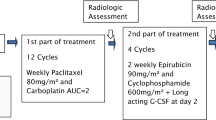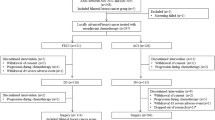Abstract
Background. The 3-week schedule with docetaxel (DTC) 75–100 mg/m2 is associated with severe neutropenia, gastro-intestinal side-effects and fluid retention in a significant proportion of patients, which may be of concern in more elderly or poor performance status patients. A phase I–II trial was carried out to test the feasibility and the activity of a new bimonthly schedule of DCT.
Patients and methods. The trial included a phase I study which aimed at the identification of dose-limiting toxicity (DLT) and maximal tolerated dose (MTD) of DCT on a bimonthly schedule. The first group of three patients received DCT 40 mg/m2, and in absence of DLT, DCT dosage was escalated by 10 mg/m2/cycle until DLT was reached. In the phase II study, patients were randomized to receive: (a) standard 3-weekly DCT at the dose of 75 mg/m2 (calibration arm); or (b) bimonthly schedule with DCT at the dose recommended in the phase I study. All patients were pretreated with chemotherapy, mostly anthracycline-based regimens, for advanced/metastatic disease. Analysis of response rates, toxicity, and dose-intensity were the main aims of the study.
Results. The DLT was represented by severe myelosuppression which was recorded in all patients treated at 70 mg/m2 dose level. Therefore, the MTD was 60 mg/m2 on a bimonthly schedule. However, the dose recommended for the phase II trial was 50 mg/m2, because no difference in delivered dose-intesity was seen between the 50 and 60 mg/m2 dose levels, and the latter dosage was still associated with grade 3 neutropenia in most patients. The parallel phase II study showed that the bimonthly schedule of DCT (50 mg/m2) allows to deliver the same dose-intensity of DCT 75 mg/m2 every 3 weeks. Grade 3–4 side-effects were rather infrequent in patients treated with the bimonthly schedule. Overall response rate (ORR) was 41 and 44% for the DCT 50 mg/m2 bimonthly and the DCT 75 mg/m2 every 3 weeks, respectively.
Conclusions. Data achieved in the phase I part of the study showed that DCT 50 mg/m2 every 15 days is the recommended dose for phase II studies, while results achieved in the phase II trial suggest that DCT 50 mg/m2 in a bimonthly schedule is active as second-line chemotherapy for MBC being able to induce an ORR in the range reported for DCT 75–100 mg/m2 every 3 weeks. The bimonthly schedule is, however, associated with relatively low toxicity. This characteristic may render the bimonthly schedule particularly attractive for future phase II trials of DCT in combination with other antineoplastic agents.
Similar content being viewed by others
References
Clavel M, Catimel G: Breast cancer: chemotherapy in the treatment of advanced disease. Eur J Cancer 29A: 589-604, 1993
Seidman AD: Chemotherapy for advanced breast cancer: a current perspective. Sem Oncol 23 (suppl. 2): 55-59, 1996
Sledge GW Jr, Antman KH: Progress in chemotherapy for metastatic breast cancer. Semin Oncol 19: 317-332, 1992
Early Breast Cancer Trialist's Collaborative Group: Systemic treatment of early breast cancer by hormonal, cytotoxic, or immune therapy. Lancet 339: 1-15, 1992
ten Bokkel Huinink WW, Prove AM, Piccard MM, Steward W, Tursz T, Wanders J, Franklin H, Clavel M, Verweij J, Alakl M: A phase II trial with docetaxel (Taxotere) in second line treatment with chemotherapy for advanced breast cancer: a study of the EORTC Early Clinical Trials Group. Ann Oncol 5: 527-532, 1994
Valero V, Holmes FA, Walters RS, Theriault RL, Esparza L, Fraschini G, Donseca GA, Bellet RE, Buzdar AU, Hortobagyi GN: Phase II trial of docetaxel: a new, highly effective antineoplastic agent in the management of patients with anthracycline-resistant metastatic breast cancer. J Clin Oncol 13: 2886-2894, 1995
Adachi I, Watanabe T, Takashima S, Narabayashi M, Horikoshi N, Aoyama H, Taguchi T: A late phase II study of RP56976 (docetaxel) in patients with advanced or recurrent breast cancer. Br J Cancer 73: 210-216, 1996
Archer CD, Lowdell C, Sinnett HD, English J, Khan S, Coombes RC: Docetaxel: response in patients who have received at least two prior chemotherapy regimens for metastatic breast cancer. Eur J Cancer 34: 816-819, 1998
O'Brien MER, Leonard RC, Barrett-Lee PJ, Eggleton SPH, Bizzari JP: Docetaxel in the community setting: an analysis of 377 breast cancer patients treated with docetaxel (Taxotere R) in the UK. Br J Cancer 10: 205-210, 1999
Alexopoulos CG, Rigatos G, Efremidis AP, Papacharalambous A, Alexopoulos A, Vassilomanolakis M, Patila E: A phase II study of the effectiveness of docetaxel (Taxotere) in women with advanced breast cancer previously treated with polychemotherapy: Hellenic Cooperative Interhospital Group in Oncology. Cancer Chemother Pharmacol 44: 253-258, 1999
Nabholtz JM, Senn HJ, Bezwoda WR, Melnychuk D, Deschenes L, Douma J, Vandenberg TA, Rapoport B, Rosso R, Trillet-Lenoir V, Drbal J, Molino A, Nortier JWR, Richel DJ, Nagykalnai T, Siedlecki P, Wilking N, Genot JY, Hupperets PSGJ, Pannuti F, Skarlos D, Tomiak EM, Murawsky M, Alakl M, Riva A, Aapro M: Prospective randomized trial of decetaxel versus mitomicyn plus vinblastine in patients with metastatic breast cancer progressing despite previous anthracycline-containing chemotherapy. J Clin Oncol 17: 1413-1424, 1999
Chan S, Friedrichs K, Noel D, Pinter T, Van Belle S, Vorobiof D, Duarte R, Gil MG, Badragi I, Murray E, Yelle L, von Minckwitz G, Korfec S, Simmonds P, Buzzi F, Mancha R, Richradson G, Walpole E, Ronzoni M, Murawsky M, Alakl M, Riva A, Crown J et al: Prospective randomized trial of docetaxel versus doxorubicin in patients with metastatic breast cancer. J Clin Oncol 17: 2341-2354, 1999
Hudis CA, Seidman AD, Crown JP, Balmaceda C, Freilich R, Gilewski TA, Hakes TB, Currie V, Lebwohl DE, Baselga J, Raptis G, Gollub M, Robles M, Bruno R, Norton L: Phase II and pharmacological study of docetaxel as initial chemotherapy for metastatic breast cancer. J Clin Oncol 14: 58-65, 1996
Loeffler TM: Is there place for dose-dense weekly schedules of the taxoids? Semin Oncol 25(suppl 12): 32-35, 1998
Dieras D: Taxoids in combination with doxorubicin in the treatment of metastatic breast cancer. Semin Oncol 25(suppl. 12): 18-22, 1998
Pagani O: Taxoids in combination with epirubicin: the search for improved outcomes in breast cancer. Semin Oncol 25 (suppl. 12): 23-26, 1998
Aapro MS: Combination docetaxel/vinolrebine for metastatic breast cancer and non-small cell lung cancer. Oncology (Huntigton) 11(suppl. 8): 46-49, 1997
Petit T, Aylesworth C, Burris H, Ravdin P, Rodriguez G, Smiths L, Peacock N, Smetzer L, Bellet R, Von Hoff DD, Rowinsky E: A phase I study of docetaxel and 5-fluorouracil in patients with advanced solid malignances. Ann Oncol 10: 223-229, 1999
Boyer M, Rishin D, Millward J, Toner GC, Bishop JF, Zalchberg J, Beith JM, Emmett E, Webb J, Sullivan AL: Phase I study of gemcitabine and docetaxel in patients with advanced cancer. Proc Am Soc Clin Oncol 18: 204, 1999(abstract)
Valero V: Combination docetaxel/cyclophosphamide in patients with advanced solid tumors. Oncology (Huntigton) 11 (suppl. 8): 34-36, 1997
Hainsworth JD, Burris III HA, Erland JB, Erland JB, Thomas M, Greco A: Phase I trial of docetaxel administration by weekly infusion in patients with advanced refractory breast cancer. J Clin Oncol 16: 2164-2168, 1998
Kotsakis A, Sarra E, Peraki M, Kourakourakis M, Apostolaki S, Souglakos J, Mavroma V, Vlachonikolis J, Georgoulias V: Docetaxel-induced lymphopenia in patients with solid tumors. Cancer 89: 1380-1386, 2000
Coates A, Gebski V, Bishop JF, Jeal PN, Woods RL, Snyder R, Byrne M, Harvey V, Gill G: Improving the quality of life during chemotherapy for advanced breast cancer. N Engl J Med 317: 1490-1495, 1987
Greco FA: Docetaxel (taxotere) administration in weekly schedules. Semin Oncol 26:(suppl. 11): 28-31, 1999
Lau DH, Young L, Xue L, Cheung A: Paclitaxel: an angiogenesis antagonist inmetastatic breast cancer model. Proc AmSoc Clin Oncol 17: 107, 1998
Burstein HJ, Younger J, Parker LM, Bunell CA, Matulonis UA, Garber JE, Clarke KD, Shulman LN, Winer EP: Docetaxel administered on a weekly basis for metastatic breast cancer: a phase II trial. J Clin Oncol 18: 1212-1219, 2000
Climent MA, Ruiz A, Llombard-Cussac A, Fermandez-Martos C, Poveda A, Dorta J, Guilliem V: Weekly docetaxel in patients with advanced malignances: toxicity profile and activity results. Proc Am Soc Clin Oncol 18: 119, 1999 (abstract)
Mey U, Kleinschmidt R, Sauerbruch T, Schmidt-Wolf I: A phase II trial of weekly docetaxel in patients with advanced metastatic breast cancer. Preliminary results. Proc Am Soc Clin Oncol 18: 134, 1999 (abstract)
Simon R: Optimal two-stage design for phase II clinical trials. Control Clin Trials 10: 1-10, 1989
Miller AB, Hoogstraten B, Staquet M, Winkler M: Reporting results of cancer treatment. Cancer 47: 207-214, 1981
Hryniuk WM: Average relative dose intensity and the impact on design of clinical trials. Sem Oncol 14: 65-74, 1987
Hryniuk WM, Bush H: The importance of dose intensity in chemotherapy of metastatic breast cancer. J Clin Oncol 2: 1281, 1984
Kaplan EI, Meier P: Non parametric estimation from incomplete observations. J Am Stat Assoc 53: 457-481, 1958
Kim Y, Takatsuka Y, Gotoh K, Hasewaga S, Aritake N, Kan K, Fukunaga M, Touno T, Oozato H, Imamoto H, Yamazaki K, Maruyama H: Pharmacological study of weekly docetaxel in patients with metastatic breast cancer. Gann To Kagaku Ryoho 26: 1437-1441, 1999
Figgitt DP, Wiseman LR: Docectaxel: an update of its use in advanced breast cancer. Drugs 59: 621-651, 2000
Pronk LC, Stoter G, Verweij J: Docetaxel (taxotere): singleagent activity, development of combination treatment and reducting side-effects. Cancer Treat Rev 21: 463-468, 1995
Author information
Authors and Affiliations
Rights and permissions
About this article
Cite this article
Gebbia, V., Borsellino, N., Testa, A. et al. Phase I–II Parallel Study of Docetaxel on a Bimonthly Schedule in Refractory Metastatic Breast Carcinoma. Breast Cancer Res Treat 77, 99–108 (2003). https://doi.org/10.1023/A:1021316218561
Issue Date:
DOI: https://doi.org/10.1023/A:1021316218561




